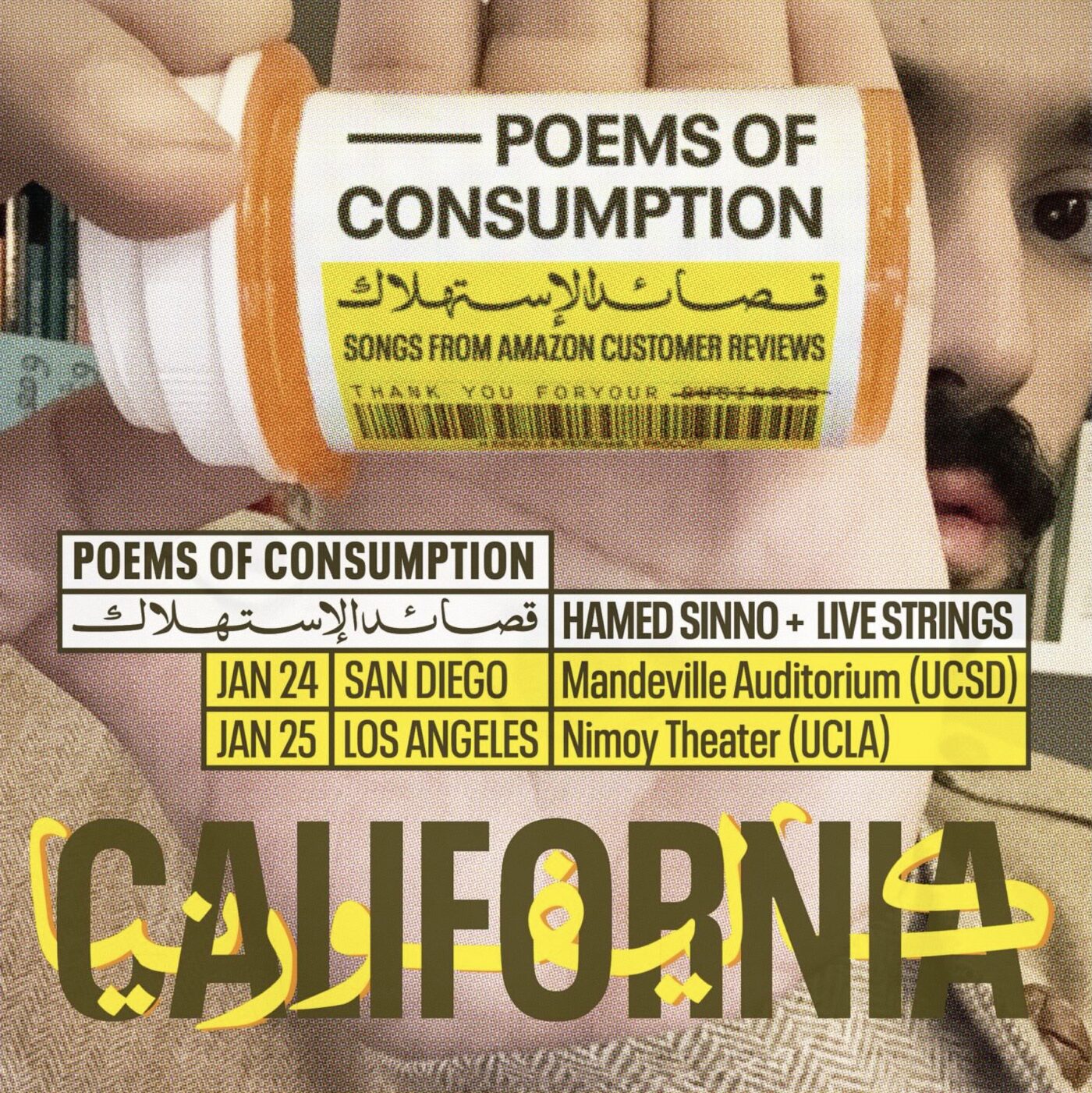
At the Nimoy Theatre in Los Angeles, CAP UCLA presented the rare and painful brilliance of Hamed Sinno’s Poems of Consumption, a delving into the world’s toxicity.
By John Lavitt
Los Angeles, CA (The Hollywood Times) 01-28-2025
Brooding with consternation and desperation, H. Sinno is the perfect performance artist for the end of the first quarter of the 21st Century. Taking the stage at the Nimoy Theatre in Los Angeles, he appears like an attractive but homeless gay man in Boy’s Town, looking for a friendly face or a place to stay. Joined by a quartet of classical strings on stage, he seems to be a down-and-out DJ shadowed by a massive video projection behind him. However, when he starts to perform, all expectations are thrown into a bucket as an unparalleled talent emerges like an expressive storm of regret and protest.
The power and depth of Sinno’s voice catches us off guard. Like Freddie Mercury reborn, his voice cannot be ignored, but the context has profoundly shifted. Imagine if Freddie Mercury had followed the creative possibilities of Bohemian Rhapsody to their endpoint. Like a medicated anarchist fighting off waves of anxiety and depression, Sinno cannot ignore the suffering so prevalent in today’s world. He is a medicated anarchist torn asunder in a Kafkaesque transaction. Indeed, the commonplace toxicity overcomes him, freezing his ambition in an iceberg of frozen tears and sweat.
Unlike Freddie Mercury, Sinno does not lose so much of himself in a cavalcade of decadence and addiction. Instead, he works in silence on his computer, composing songs and poems of protest against the consumptive urges of a broken world. From the beginning to the end of his performance, the investigative genius of his lyrical somersaults was breathtaking. Often, he interprets the world by letting the world speak for itself. An ideal example was his subway song.
While riding the London tube, Sinno’s subway train was halted before it reached the station. What the passengers learned was that a man was threatening suicide on the tracks, and the ride would be stopped until the situation could be handled appropriately by the authorities. Most importantly, the focus was on saving the man’s life while protecting everyone else. Seeing an opportunity, Sinno began recording the voices of the irate passengers.

As minutes passed, the frustration and impatience of the passengers rose. Rather than being upset at an inadequate mental health support system or the inability of the authorities to resolve the situation quickly, their anger was directed at the suicidal man. Rather than feeling empathy for a lost soul, the voices lashed out at him. In the final expression of hatred, the voice of a middle-class British woman rings out: “Why don’t the police just shoot him and get it over with.” Although this is a paraphrase, you get the meaning and the intent.
Born of such extremity, Sinno composed a song from the slogans on Subway advertisements he photographed after the event. The slogans are desperate cries for meaning and satisfaction. You can see how the angry voices on the subway car are the direct products of these slogans. Perhaps the most potent was this combination of two advertisements: “We hope these messages find you well. We welcome you to Hell!”
Indeed, most of the “Poems of Consumption” are excerpted from Amazon Customer Reviews. In expressing our consumption in the modern world, Sinno excavates strands of our soul torn out of the scalp and left behind. Indeed, it is a new vision of being scalped by ourselves. One also imagines Sinno in Thomas Mann’s The Magic Mountain, dying of consumption in a time long past when tuberculosis was all the rage. Like the disease that consumed our bodies, Amazon and online shopping consume our attention, desire, and humanity.
In the show, Sinno discusses his struggles with finding the proper medications to allow him to live in the world without being frozen in that iceberg mentioned before. He fights with his medical providers to access medications, then abandons them when they stymie his creativity or quiet the expressive storm that is his mind. Like so many of us in the cosmic morass of the 21st Century, Sinno is trying to find a way to live morally in a world that feels patently amoral at best and downright evil at worst.